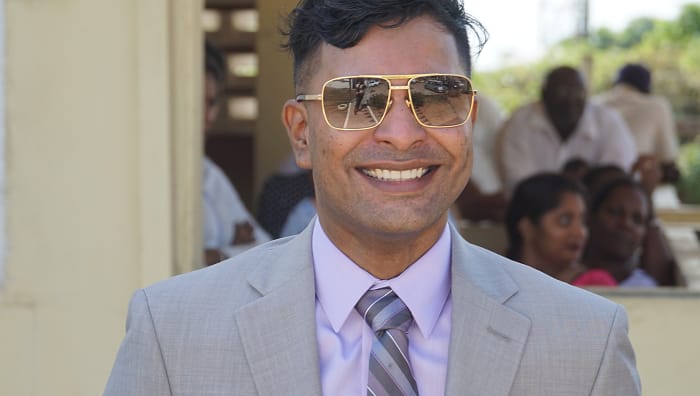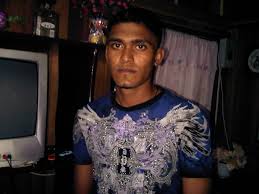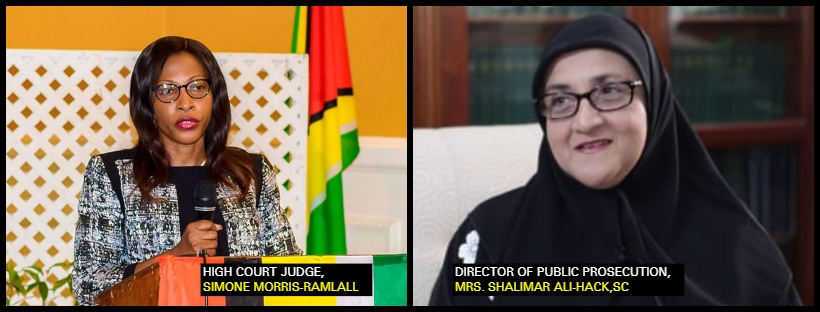By Feona Morrison
State Prosecutors failed to produce sufficient evidence at the close of a Preliminary Inquiry (PI) to prove that Guyana-born U.S.-based businessman, Marcus Bisram is linked to the October 2016 murder of Berbice Carpenter, Fiayaz Narinedatt, who was allegedly beaten by several men before his lifeless body was dumped on the roadway.

The foregoing was highlighted in a 32-page judgment by High Court Judge, Simone Morris-Ramlall, who Monday ordered that Bisram be immediately released from jail where he was on remand for the murder pending trial at the High Court.

The Judge’s ruling essentially quashed a directive by Director of Public Prosecutions (DPP), Shalimar Ali-Hack for Bisram’s committal to stand trial before a Judge and jury which was made pursuant to Section 72 of the Criminal Law Offences Act, Chapter 10:01.
Bisram’s PI commenced on January 20, 2020 and concluded on March 30, 2020 before Magistrate Renita Singh at the Whim Magistrate’s Court. At the close of the prosecution’s case, the Magistrate discharged Bisram on the ground that a prima facie case had not been established against him. The purpose of a PI is to determine whether there is a sufficient case or evidence or grounds to put the defendant on trial by the High Court.
However, on the day of the discharge, the DPP exercised her powers under Section 72 (1) and (2) (ii) (b) of the Criminal Law Offences Act, Chapter 10:01 by requesting that the depositions be sent to her and directing that the PI be reopened with a view to committing Bisram.
In compliance with the directions issued, the Magistrate reopened the PI on April 02, 2020 and called upon Bisram, who had been rearrested on March 30, 2020, to lead a defence.
At the close of the case for the Defence, the Magistrate found that there was insufficient evidence to support the charge and adjourned the matter to April 06, 2020 for further directions from the DPP.
On April 06, 2020, the DPP, pursuant to Section 72 (2) (ii) (b) of the above mentioned Act, directed that Bisram be committed to stand trial in the High Court. This direction was duly complied with on the said date by the Magistrate.
WORTHLESS, UNRELIABLE
In concluding that the DPP’s directive was unlawful, Justice Morris-Ramlall, inter alia, examined the testimony of the prosecution’s star witness, Chaman Chunilall, whose evidence she described as the “body and soul” of the prosecution’s case as there is no other evidence, direct or circumstantial, linking Bisram to the crime.
The High Court Judge reasoned, “At the close of the case for the prosecution, the evidence of Chunilall was totally discredited and rendered manifestly unreliable. This is the kind of the case that required the Magistrate to be particularly concerned about credibility as the evidence of Chunilall is to my mind worthless.”
During the PI, Chunilall, in his evidence-in-chief testified as follows: “… Fayas [Narinedatt] go at the back at the washroom and then Marcus walk and go at the back and then he start feel up Fayas all part of he body and then Fayas slap am 5 box. And then Marcus walk and go back at the front and then he walk and go to the front and as he reach at the front he tell all 5 of them boy Fayas just slap he just beat and kill he till he dead. Radho, Lloydie, Brukhand and Rasta man they start drag am outside the yard and start chuck am outside the yard…”
According to the Judge, under cross examination, Chunilall stated that he had initially told the police that he did not know anything about the story and that that was the truth. She said that there is also evidence that the truth is that Chunilall did not witness any fight, and has also denied knowledge of the contents of what was purported to be his police statement and said that he could not read nor write.
“His evidence is that he affixed his thumb print to the statement because he had been arrested by the police who told him that they would release him if he did. He agreed that his testimony was premised on the said statement and that he had been told that he had to give testimony consistent with the statement,” Justice Morris-Ramlall noted in her decision.
Based on the lengthy judgment, Chunilall agreed with suggestions put to him by Bisram’s lawyers that one Saddam and the prosecutor had reminded him of what he needed to state in his evidence, including what Bisram had said on the night of the incident that led to Narinedatt’s death. He subsequently stated that if they had not told him “these specific things” he would still say them.
At another point, Chunilall testified that he was pressured by Sadam and Narine, a policeman, to give the testimony he gave and that he felt that he would get into trouble if he did not comply.
DAMNING EVIDENCE
Nonetheless, Justice Morris-Ramlall pointed out that the most damning evidence elicited under cross-examination is Chunilall responding “yes” after he was asked by Bisram’s lawyers, “The truth is you didn’t hear Mr. Bisram say anything because the music was so loud?”
Further to that, she said the witness also responded “yes” when he was asked the following: “You only said you heard Mr. Bisram say these things because you were told to do so?”
Having carefully examined the evidence disclosed in the depositions, Justice Morris-Ramall held, “In my view, the evidence disclosed in the depositions does not support the DPP’s decision to instruct the Magistrate to re-open the inquiry or to subsequently instruct that [Bisram] be committed to stand trial in the High Court.”
UNSAFE
According to the High Court Judge, “The evidence disclosed in the depositions did not meet the requisite evidentiary threshold to support calling upon [Bisram] to lead a defence at the close of the prosecution’s case. No prima facie case had been made out. The same applies to the committal of [Bisram]. The evidence is insufficient, or, in other words, it is not of the quality that a reasonable jury properly directed could safely convict on it. The state or extent of the evidence is a relevant factor that should have been taken into account by the DPP in arriving at her decisions.”
With regard to the above, Justice Morris-Ramlall ruled that the DPP did not lawfully exercise her discretion under Section 72 of the Criminal Law Offences Act, and that the committal by the Magistrate cannot stand.
Hence, the Judge issued an order quashing the DPP’s directive for Bisram’s committal; an order that the arrest of Bisram on March 30, 2020 was unlawful; an order that the continued incarceration of Bisram since his arrest on March 30, 2020 is unlawful; another order compelling the DPP, Attorney General and Commissioner of Police to release Bisram from custody forthwith; and a next order preventing the DPP from bringing a murder charge against Bisram in the High Court.
Throughout the High Court hearing, Bisram was represented by lawyers; Arudranauth Gossai, Sanjeev Datadin, Glen Hanoman, Bernard Da Silva, and Dexter Todd. Appearing for the State was Solicitor General Nigel Hawke and two other lawyers from the Attorney General’s Chambers.













